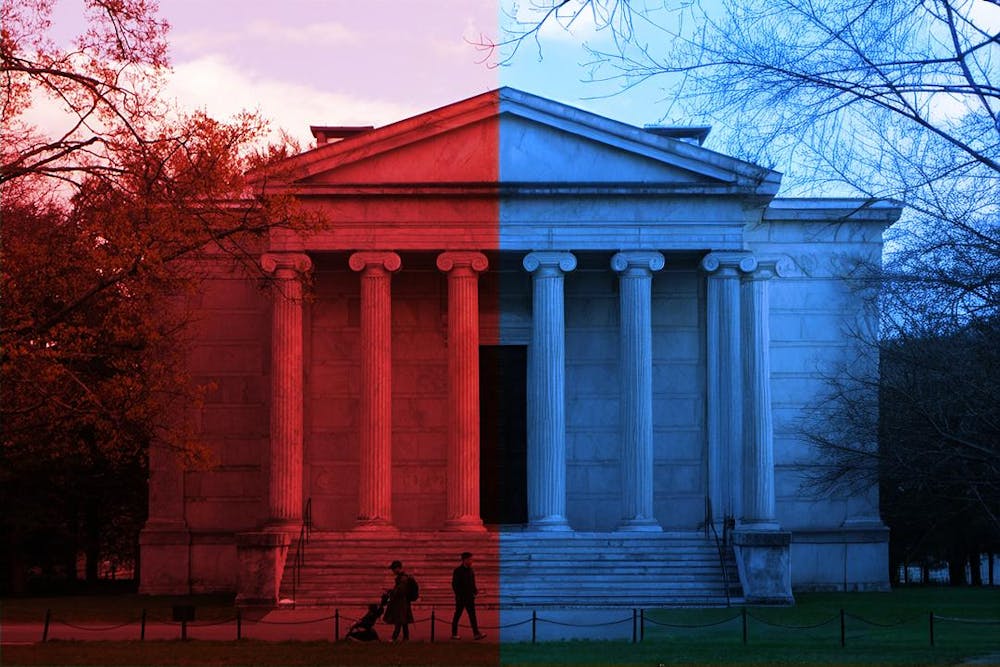On Nov. 8, the American Whig-Cliosophic Society presented former West Virginia Senator Joseph Manchin III with the James Madison Award for Distinguished Public Service — the society’s highest honor.
I’ve followed Senator Manchin fairly closely in recent years. His exit from the Senate this past January, along with fellow Democrat-turned-Independent Kyrsten Sinema, signaled that the bipartisanship these two centrists favored was a way of the past; upon her exit, Sinema remarked that, in today’s environment, “compromise is a dirty word.” Knowing this history, I thought that Senator Manchin’s remarks at Princeton would center on promoting consensus amidst political division.
But the senator’s policy platform, like his ardent support for the filibuster and term limits, was not my key takeaway from the talk. More essential to his message was a conviction that he highlights in his 2025 memoir “Dead Center”: public service is about serving the people, and political leaders are meant to represent their constituency, not themselves.
Manchin’s commitment to representing his constituents and ensuring that no American is left behind features prominently in the rhetoric of today’s electoral victors, including Donald Trump and Zohran Mamdani. As students at an elite institution, we all stand to benefit from understanding how leading in a way that stands up for, and represents the interests of, every American is a winning formula that seems to resonate with Americans across the political spectrum. Princetonians of all political orientations, especially those who want to be in public service, should recognize that we share good-faith goals of representing the everyman, even and especially with our political opponents.
Donald Trump’s 2016 campaign positioned Trump, an economic but not a political elite, as an outsider who would “drain the swamp” in Washington. Both of Trump’s winning campaigns espoused messages that resonated with the “common man.” In essence, the “America First” agenda is, at least nominally, about representing Americans who feel left behind by elite politicians.
And Trump’s success is only one example of the popularity of promises of authentic, people-oriented representation. Similarly, Zohran Mamdani spoke to New Yorkers who were struggling with the cost of living, promising that they were just as important as the wealthy New York elite. Mamdani, a junior assemblyman, rose from obscurity to secure the Democratic nomination, a sign of the public’s desire for representation and their rejection of the political machine exemplified by runner-up Andrew Cuomo.
It’s true that left- and right-wing promises of representation focus on different people whom they consider “left behind.” Trump often targeted messaging to factory workers in the American Heartland whose jobs went overseas, while Mamdani spoke to young voters concerned about cost of living. But nonetheless, in true centrist fashion, Manchin’s message has potential to appeal to voters on both sides.
This people-centric brand of politics is not just relevant to, say, a SPIA major whose goal is to hold elected office. Princeton’s own elected officials can take notes from Manchin’s message. Undergraduate Student Government perhaps faces a greater challenge in that their electorate does not actively express such a desire for representation; many students are, at best, indifferent toward the actions of USG. So USG must determine how, with such a diverse spread of “public” sentiment, they can still serve as a body that is representative of student interests and earn the active support that may result from a more Manchin-esque approach.

In the real world, the Princeton degree comes with some baggage. Whether we agree or not, Princeton and the Ivy League are often symbols of elite power in the United States. Manchin’s message about the value of truly representative public service shows that, given Americans’ recent attitude toward elites and support for promises of representation, it is incumbent upon Princetonians who hope to enter public service, whether through organizing or running for elected office, to prove that they are worthy of a vote.
In that sense, Senator Manchin’s message draws upon citizens’ fundamental democratic desire for a voice. A Trump voter and a Mamdani voter are unlikely to find common ground on many policy issues. But regarding their end goal — finding representation — they align. No matter their background and no matter their identification with the ideological left or right, Princetonians who are engaged in civic service should unite around a shared goal of representation. In a polarized political environment, that glimmer of unity could be the common ground that brings left and right together — a fitting outcome of Manchin’s goals and a truly noble pursuit.
Ian Rosenzweig ’29 is a prospective SPIA major from Bryn Mawr, Penn. who thinks that even the slightest bit of common ground is a beacon of hope for political unity. You can reach him at ir2411[at]princeton.edu.









